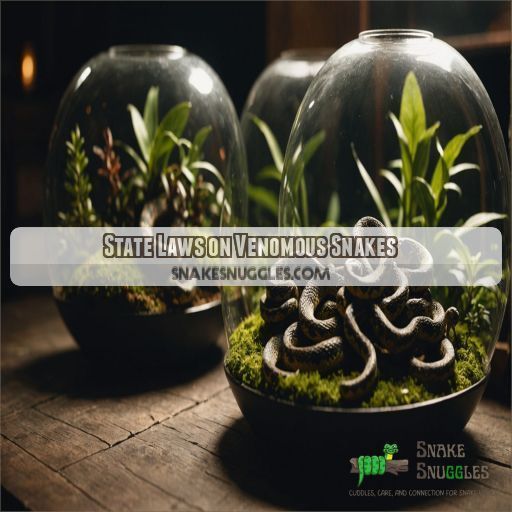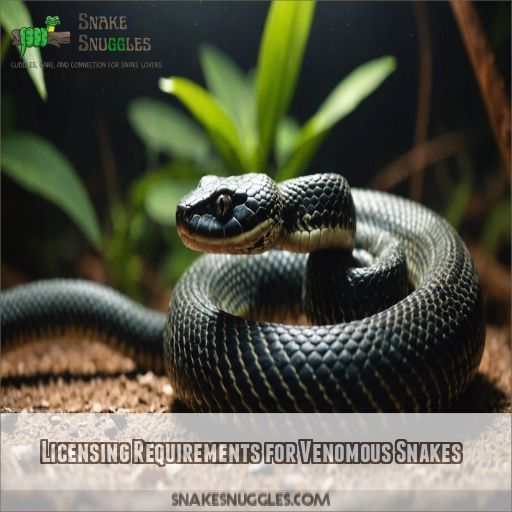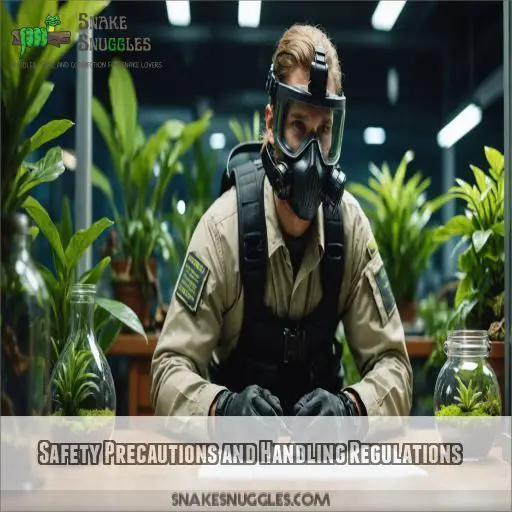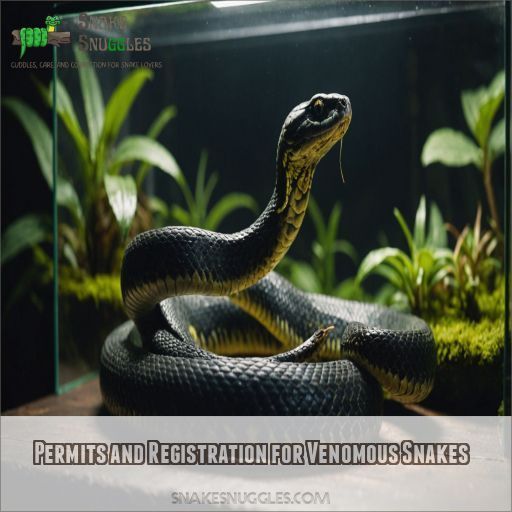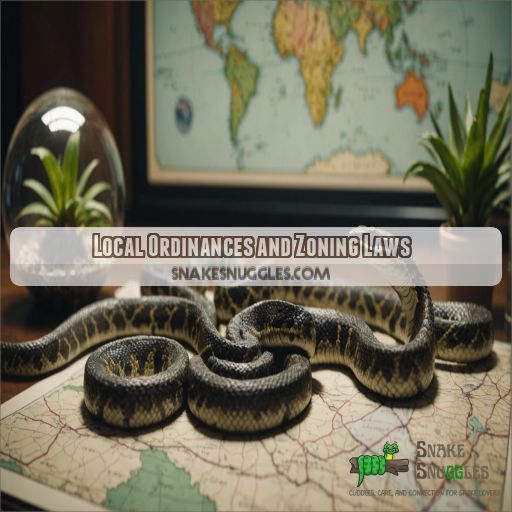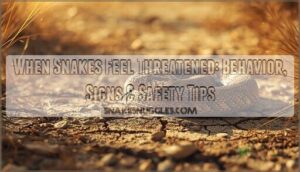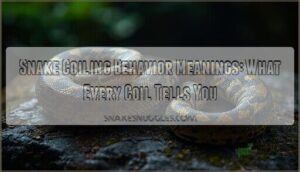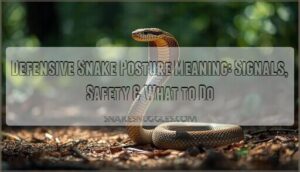This site is supported by our readers. We may earn a commission, at no cost to you, if you purchase through links.
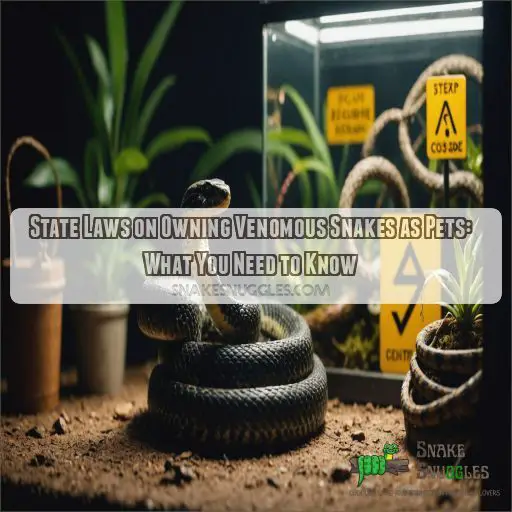
Twenty states permit ownership with a permit, while Alaska, California, and Hawaii have strict bans. To navigate this regulatory landscape, you’ll need to meet specific requirements.
These requirements include meeting age and experience requirements, securing liability insurance, and passing facility inspections. Meeting these requirements is crucial to ensuring a safe and lawful experience.
Understanding state laws on owning venomous snakes as pets is just the beginning. Mastering the art of snake ownership requires knowledge, preparation, and attention to detail.
Table Of Contents
Key Takeaways
- As you enter the world of venomous snake ownership, you’ll need to navigate a complex web of state laws and regulations that can either grant you freedom or result in severe penalties – so, do your research and stay on the right side of the law.
, you’ll need to navigate a complex web of state laws and regulations that can either grant you freedom or result in severe penalties – so, do your research and stay on the right side of the law!
- To become a venomous snake owner, you’ll typically need to meet specific requirements, such as age and experience requirements, securing liability insurance, and passing facility inspections – don’t be surprised if it feels like a snake trying to squeeze through a tiny hole!
- When it comes to safety precautions and handling regulations, you’ll want to make sure you’ve got an escape-proof enclosure, follow proper handling protocols, and have a solid emergency response plan in place – after all, you don’t want a venomous snake on the loose, causing chaos and destruction!
- With permits and registration requirements varying by state, it’s crucial to understand the rules and regulations in your area, including renewal and revocation procedures, to avoid any surprises – stay on top of it, and you’ll be well on your way to becoming a confident and responsible snake owner!
State Laws on Venomous Snakes
If you’re considering adding a venomous snake to your pet collection, it’s really important to understand the complex web of state laws regulating their ownership. From permit requirements to outright bans, each state has its own unique set of rules, and ignorance of these laws can lead to serious consequences, including fines and even jail time.
Overview of State Regulations
As a snake enthusiast, As a snake enthusiast, you’re probably curious about the snake ownership regulations surrounding venomous snake ownership.
. Here’s the lowdown:
- State regulations vary widely, so it’s essential to research your local laws.
- Some states have blanket bans on venomous snakes.
- Others require permits or licenses.
- Specific species may be restricted or prohibited.
- Ownership restrictions can impact your livelihood and freedom.
States Permitting Ownership With License
Now that you’ve got a handle on the overall state regulations, let’s get to the good stuff – which states will actually let you bring home a venomous snake with a license? About 20 states permit ownership with a permit, including Arizona, Florida, and Texas. Each state has its own licensing procedures, so be prepared to do some paperwork.
States Banning Venomous Snake Ownership
You’re probably wondering which states draw a hard line regarding venomous snakes as pets. Well, here are the top three states with strict state bans:
- Alaska: No permit or license can get you around this ban.
- California: Don’t even think about importing a venomous snake here.
- Hawaii: Reptile legislation is super strict, and ownership consequences are severe.
Penalties for Unlicensed Ownership
You’re thinking of owning a venomous snake without a license? Think again! Getting caught can lead to serious consequences. Here’s a snapshot of what you might face:
| State | Fines | Jail Time |
|---|---|---|
| California | Up to $10,000 | 1-3 years |
| Florida | Up to $5,000 | 1-2 years |
| Texas | Up to $2,000 | 6-12 months |
| New York | Up to $1,000 | 30 days-1 year |
Don’t risk it! Get licensed and avoid confiscation, community service, and a pricey legal defense.
Licensing Requirements for Venomous Snakes
If you’re considering owning a venomous snake as a pet, you’ll need to meet specific licensing requirements that vary by state.
These requirements are designed to make sure you can safely care for these unique animals.
They typically include age and experience requirements, liability insurance, and facility inspections to guarantee you’re prepared for the risks and responsibilities that come with venomous snake ownership.
Age and Experience Requirements
Now that you’re familiar with state laws on venomous snakes, let’s talk about getting licensed. To qualify, you’ll typically need to meet minimum age requirements (usually 18 or 21) and provide proof of experience handling venomous snakes. Some states also require completion of training programs or prior ownership experience to verify your knowledge and skills.
Liability Insurance and Bonding
If you’re thinking about owning a venomous snake, you’ll want to know about liability insurance and bonding. Many states require owners to carry liability insurance, which can range in cost from $500 to $5,000 annually. Here are some key considerations:
- Insurance costs: varies by state and provider
- Bonding limits: typically $10,000 to $50,000
- Coverage types: bodily injury, property damage, and business interruption
Facility and Safety Inspections
As you prepare for facility and safety inspections, remember that it’s not just about passing a test – it’s about ensuring your venomous snakes are safely contained. Inspectors will review your enclosure’s design, escape protocols, and safety equipment. Make sure you’ve got a thorough inspection checklist and have met handler training standards to avoid any surprises.
Safety Precautions and Handling Regulations
As you consider bringing a venomous snake into your home, it’s important to understand the safety precautions and handling regulations that come with it. From escape-proof enclosures to first aid plans, knowing the rules and guidelines will help you make sure a safe and responsible experience for both you and your slithery friend.
Escape-Proof Enclosures and Escape Protocols
Building an escape-proof enclosure is super important for keeping your venomous pets safely contained. Use sturdy, bite-resistant materials like tempered glass or heavy-duty acrylic. Implement multiple locks and secure entry points to foil even the most determined snake. And always have a well-rehearsed escape plan – for you and your slithery friends – in case the unthinkable happens.
Handling and Feeding Restrictions
Now that you’ve got an escape-proof enclosure, Now that you’ve got an escape-proof enclosure, it’s time to think about handling and feeding your venomous snake copperhead snake facts safely.
. Here are some key considerations:
- Always wear protective gear, like gloves and a face shield.
- Use feeding tongs to minimize contact.
- Never handle a venomous snake when it’s hungry or shedding.
- Take a training course to learn proper handling protocols.
Warning Signs and Public Notification
Now that you’ve got a handle on safely handling your venomous snake, it’s time to think about warning others.
You’ll need to post clear warning signs around your property to alert visitors, neighbors, and emergency responders.
Check local laws for specific design requirements and make sure to notify your community about the potential risks.
Transparency is key to public safety awareness.
First Aid and Emergency Response Plans
When disaster strikes, you’ll want a solid plan in place. Develop a first aid and emergency response plan in case of a venomous snakebite. Include phone numbers for medical response teams and a bite reporting protocol. Know the nearest hospital with snakebite treatment capabilities. Stay calm, act fast, and follow your emergency protocols to minimize damage.
Permits and Registration for Venomous Snakes
If you’re serious about owning a venomous snake as a pet, you need to understand the permitting and registration requirements in your state.
After all, you don’t want a surprise visit from a wildlife officer.
In this section, we’ll walk you through the process of obtaining a permit, registration and record-keeping requirements, and what to expect during inspections and compliance checks.
Obtaining a Permit for Venomous Snake Ownership
Now that you’re familiar with safety precautions and handling regulations, let’s tackle the permit application process. To obtain a permit for venomous snake ownership, you’ll need to:
- Meet age and experience requirements
- Provide required documentation (e.g., liability insurance, veterinary care plans)
- Pay permit fees (varies by state)
- Agree to renewal procedures
- Comply with permit restrictions (e.g., snake species, enclosure requirements)
Registration and Record-Keeping Requirements
Now that you’ve obtained a permit for your venomous snake, it’s time to think about registration and record-keeping. You’ll need to maintain detailed records of your snake’s habitat, feeding schedule, and veterinary care, much like the requirements for owning a pet that helps with nature’s pest control.
, feeding schedule, and veterinary care. Check with your state for specific record-keeping formats and renewal deadlines. Don’t forget to think about data privacy concerns when storing sensitive information.
Inspections and Compliance Checks
Now that you’ve got your registration and record-keeping in order, it’s time to think about inspections and compliance checks. To make sure you’re meeting the requirements, you can expect:
- Regular inspections (at least annually) to verify compliance with safety protocols and permit conditions
- Compliance standards for enclosure maintenance, snake handling, and emergency preparedness
- Enforcement actions for non-compliance, which may include fines or permit suspension
Renewal and Revocation of Permits
As you enjoy your venomous snake, remember that permits don’t last forever. Typically, renewal is required annually or biennially, and involves updating registration, paying fees, and passing compliance audits. But, if you’re found guilty of non-compliance, your permit might be revoked. Don’t worry, you can appeal, but it’s easier to follow the rules from the start.
Local Ordinances and Zoning Laws
When you’re thinking about owning venomous snakes as pets, you need to check out local ordinances and zoning laws that could affect your hobby, while also considering proper snake care.
, you need to check out local ordinances and zoning laws that could affect your hobby. From municipal laws and zoning restrictions to homeowners association rules, understanding these regulations will help you avoid potential conflicts and make sure you’re following state and federal laws.
Municipal Laws and Regulations
As you navigate the complex web of laws surrounding venomous snake ownership, don’t overlook municipal laws and regulations. These local ordinances can be a real snake in the grass, catching you off guard if you’re not prepared. Here are some key things to keep in mind:
- Research local laws regarding exotic pet ownership and permits required, especially when deciding between a pet snake vs pet lizard.
.
- Check if your city has specific liability insurance requirements.
- Familiarize yourself with inspection and enforcement procedures.
Zoning Restrictions and Land-Use Regulations
As you navigate municipal laws, you’ll also need to take into account zoning restrictions and land-use regulations. Think of these as the "house rules" for your neighborhood. To keep your venomous snake, you may need land-use permits or zoning variances, which can be influenced by property values, neighborhood concerns, and environmental impact. Research these regulations to avoid any surprises.
Homeowners Association Rules and Restrictions
Regarding homeowners association (HOA) rules and restrictions, you’ll want to review your community’s bylaws before bringing home a venomous snake. Many HOAs have pet breed restrictions, size limits, and noise ordinances that may impact your slithery friend. Be prepared for home pet inspections and potential pet insurance requirements to guarantee a harmonious living situation.
Conflicts With State and Federal Laws
Traversing local ordinances and zoning laws can be a snake pit of confusion! When state and federal laws clash, understanding the hierarchy is vital. Federal preemption rules often override local laws, especially regarding interstate snake transport and national wildlife protection. However, constitutional rights issues can arise when local laws contradict state or federal regulations.
Frequently Asked Questions (FAQs)
What insurance coverage is required for venomous snake owners ?
As a venomous snake owner, you’ll need liability insurance to cover potential bites or escapes, with coverage limits varying by state and locality – don’t get caught off guard, make certain you’re protected and compliant!
How do I transport venomous snakes across state lines ?
Transporting venomous snakes across state lines? Get familiar with the Lacey Act and acquire a permit from the US Fish and Wildlife Service. Research the destination state’s laws, too – you don’t want any hiss-terical surprises!
What are the penalties for violating venomous snake laws ?
Breaking venomous snake laws can cost you dearly – fines range from several hundred dollars to $50,000, and you might even face a year in prison . Always check local laws before bringing home a slithery friend (Source).
Can I breed venomous snakes in my home state ?
You’re enthusiastic about breeding venomous snakes, but first, check your state’s laws. Some states require permits or licenses, while others prohibit it entirely. Research your local regulations to avoid a potentially costly and slithery mistake.
Are there specific tax implications for owning venomous snakes ?
Snake-ing your way through tax season? As a venomous snake owner, you’ll need to navigate specific tax implications, like potential business income from breeding or exhibiting, and deductions for specialized care and equipment.
Conclusion
Did you know that nearly 20 states permit venomous snake ownership with a permit? Managing the complex web of state laws on owning venomous snakes as pets can be intimidating.
Owning a venomous snake is a significant responsibility that requires attention to detail, specialized care, and compliance with regulations.
Mastering state laws on owning venomous snakes as pets is crucial to becoming a confident and responsible snake owner. With the right knowledge and preparation, you can guarantee a safe and lawful experience.

